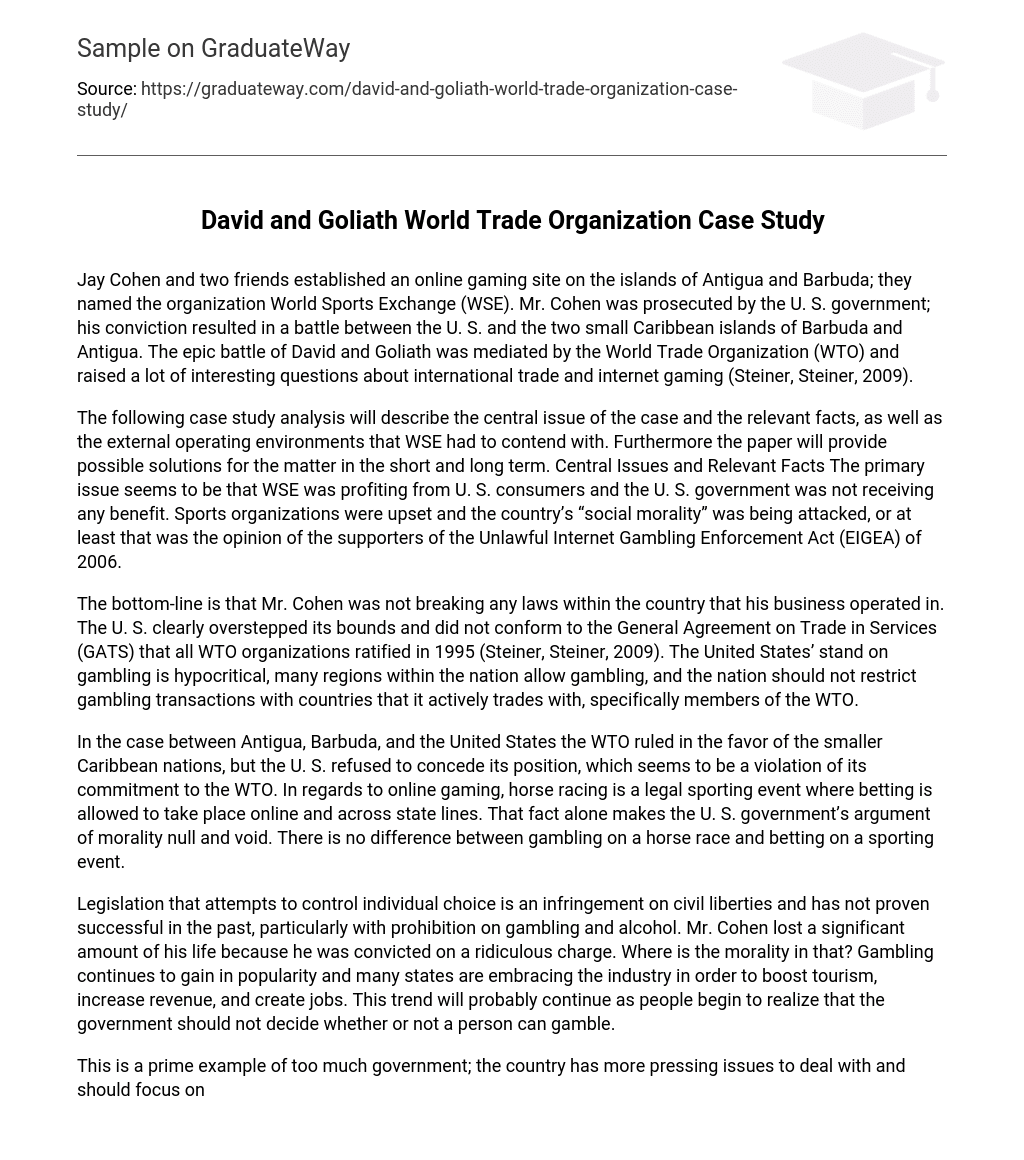Jay Cohen, along with two companions, founded a website for online gaming known as World Sports Exchange (WSE) in Antigua and Barbuda. The US government’s legal action against him caused a controversial dispute between the US and the Caribbean islands. This confrontation was resolved through the involvement of the World Trade Organization (WTO), sparking meaningful conversations regarding global trade and internet betting (Steiner, Steiner, 2009).
This case study analysis focuses on the main problem and relevant information, along with the external operating environments faced by WSE. Additionally, potential short-term and long-term solutions for the issue will be presented.
The primary issue revolves around WSE’s profit generation from U.S. consumers without offering any advantages to the U.S. government. This dissatisfaction among sports organizations is viewed as an assault on the country’s “social morality” by proponents of the Unlawful Internet Gambling Enforcement Act (EIGEA) of 2006.
Mr. Cohen remained within the boundaries of his country’s laws, but the United States overstepped its jurisdiction and neglected to adhere to the GATS (General Agreement on Trade in Services), a universally accepted agreement by all WTO (World Trade Organization) members in 1995 (Steiner, Steiner, 2009). The U.S. holds an inconsistent position regarding gambling as it allows it domestically in specific regions, yet should refrain from impeding gambling transactions with other WTO member nations involved in active trade.
Antigua, Barbuda, and the United States were involved in a case before the WTO. They obtained a positive ruling from the organization. However, the U.S. violated its duty to the WTO by rejecting its position. The justification provided by the U.S. government on moral grounds concerning online gaming is baseless because interstate horse racing permits online betting. This indicates that there is no differentiation between gambling on a horse race and wagering on a sporting event.
Regulating personal choice through legislation is an infringement on civil liberties and has a historical track record of ineffectiveness, as seen in the failures of gambling and alcohol prohibition. Mr. Cohen experienced significant life consequences due to an unjust conviction, raising moral questions about its justification. Despite this, the popularity of gambling endures, with numerous states embracing the industry to boost tourism, generate revenue, and create employment opportunities. This ongoing trend suggests that individuals are recognizing that it is not the government’s responsibility to dictate their ability to gamble.
The excessive intervention of the government is evident in this case, diverting attention from crucial issues that truly affect the American people. It is essential for the country to prioritize addressing these problems. The impact of technology plays a significant role here, as WSE conducted all transactions online, over the phone, or through wire transfers. The U.S. government’s specific concern focused on the online platform through which WSE earned profits from U.S. consumers. According to the country’s standpoint, Mr. Cohen violated the Wire Transfer Act of 1961, a law that has clearly become outdated since it was enacted prior to the invention of the internet.
WSE could have avoided the legal problem that arose if it had recognized the potential issue with conducting its business in the United States. The case involved significant government involvement, as the United States believed that online gambling had a negative impact on its moral fabric, particularly among young people. This posed a challenge for WSE since most of its customers were based in the United States, making it necessary for the U.S. to intervene. However, WSE did not consider this position because its offices were located outside of U.S. soil.
In addition, understanding and anticipating potential risks associated with foreign markets is crucial for companies operating in global markets, especially when dealing with influential nations like the United States. It is also important to consider trade agreements within the WTO when handling disputes; however, this process fails when parties refuse to comply.
Furthermore, differing views on gambling and varying perspectives on how sovereign nations should regulate gaming activities are at the heart of cultural issues in this case.
Caribbean nations and the United States have different cultural perspectives. Moreover, the United States promotes a culture of entitlement among its citizens and frequently takes on a global policing role. However, in this specific situation, the country demonstrated its belief that certain rules do not apply to a superpower. Furthermore, some government officials actively promote “Christian Values” through legislation to the general public. In conclusion, this analysis allows for the identification of Long Term and Short Term Recommendations.
Overall, it is crucial for the United States to uphold its dedication to the World Trade Organization (WTO) and avoid implementing arbitrary regulatory modifications. Furthermore, compensating both Antigua and Barbuda for the adverse economic effects they have faced due to this issue is essential. Additionally, Mr. Cohen should be reimbursed for the time he has lost. The United States ought to strive towards a more standardized approach in its laws by either legalizing or completely prohibiting gambling.
Significantly, there is an increasing acceptance of gambling within American society, demonstrated by several states expressing support for this notion.
Globalization necessitates positive trade relations in the business sphere, affecting the reputation of the United States as a global leader and exemplar of a free market economy. In the long run, efforts by the United States to regulate online gambling prove ineffective due to banks facing challenges in monitoring transactions considered illegal under UIGEA. Moreover, given that the internet transcends national boundaries and lacks comprehensive jurisdictional control, the Justice Department is unable to regulate international agencies.





